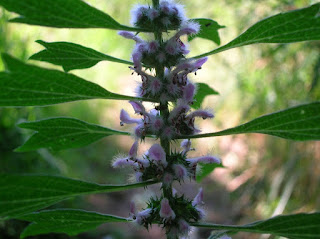 Hartgespan is al een tijdje uitgebloeid en levert nu rijp zaad. De hele bloeiende plant wordt samen met meidoornbloesem gebruikt tegen, hoe kan het anders, het spannen van het hart.
Hartgespan is al een tijdje uitgebloeid en levert nu rijp zaad. De hele bloeiende plant wordt samen met meidoornbloesem gebruikt tegen, hoe kan het anders, het spannen van het hart.De plant wordt nog weinig gebruikt, toch zou daar, gezien het wetenschappelijk onderzoek, in de toekomst wel verandering in kunnen komen. Al zijn de autoriteiten uit het verleden best kritisch geweest over de mogelijke werking van hartgespan.
Zo zegt Dodoens Hertsghespan en wordt in der medecijnen niet ghebruyckt/ nochtans zoo wordet van sommighen hedendaechs seer goet ende sonderlinghe ghepresen teghen die pijne/ weedom/ cloppinghe/ en bevinghe van der herten.
En in de Flora Batava geschreven rond 1882 Plaat 263 in deel IV. De geheele Plant geeft een sterken reuk en een weinig bitteren smaak: oudtijds oordeelde men dezelve te zijn, hartsterkend , toonwekkend , prikkelende , openende; maar tegenwoordig erkent men, dat deze eigenschappen, waar van de eerste haar den naam heeft doen geven van Cardiaca, dat is, hartsterkend, vrij onzeker zijn, waarom zij dan ook tegenwoordig zeer weinig gcbruikt wordt, noch in de Apotheek, noch onder de Huismiddelen. (Favrod de Fellens).

Maar Culpepper wrote of Motherwort: 'Venus owns this herb and it is under Leo. There is no better herb to drive melancholy vapours from the heart, to strengthen it and make the mind cheerful, blithe and merry. May be kept in a syrup, or conserve, therefore the Latins call it cardiaca.... It cleansethe the chest of cold phlegm, oppressing it and killeth worms in the belly. It is of good use to warm and dry up the cold humours, to digest and disperse them that are settled in the veins, joints and sinews of the body and to help cramps and convulsions.'
- Une action contra-adrénergique (s’oppose à la réaction de stress) et antispasmodique ;
- Une action anxiolytique et sédative générale non négligeable ;
- Une diminution de l’hyperexcitabilité portant sur les fourmillements des extrémités, les crampes, et l’asthénie (fatigue) matinale
Recent wetenschappelijk onderzoek lijkt de werking op het hart te ondersteunen.
The results showed that constituents (chlorogenic acid, orientin, quercetin, hyperoside, and rutin) of L. cardiaca herb extract uncouple (by 20-90 %) mitochondrial oxidation from phosphorylation, partially inhibit (by ~ 40 %) the mitochondrial respiratory chain in cases of pyruvate and malate as well as succinate oxidation, and effectively attenuate the generation of free radicals in mitochondria. Since partial uncoupling of mitochondria, respiratory inhibition, and decreased ROS production are proposed as possible mechanisms of cardioprotection, our results imply that L. cardiaca herb extract could be a useful remedy to protect cardiac muscles from the effects of pathogenic processes. http://www.ncbi.nlm.nih.gov/pubmed/24841965 Planta Med. 2014 May;80(7):525-32.
The effect of Leonurus cardiaca herb extract and some of its flavonoids on mitochondrial oxidative phosphorylation in the heart.
Phytother Res. 2013 Aug;27(8):1115-20. doi: 10.1002/ptr.4850. Epub 2012 Oct 8. Leonurus cardiaca L. (motherwort): a review of its phytochemistry and pharmacology.
https://sites.google.com/site/kruidwis/planten-van-a-tot-z/leonurus-cardiaca-hartgespan-1


Geen opmerkingen:
Een reactie posten